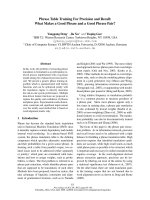Good advice for a bad economy
Bạn đang xem bản rút gọn của tài liệu. Xem và tải ngay bản đầy đủ của tài liệu tại đây (24.7 MB, 238 trang )
GOOD ADVICE
FOR A BAD ECONOMY
GOOD ADVICE
FOR A BAD ECONOMY
JOHN VENTURA
AND MARY REED
b
BERKLEY BOOKS, NEW YORK
This is a work of fiction. Names, characters, places, and
incidents are either the product of the author's imagination or are
used fictitiously, and any resemblance to actual persons,
living or dead, business establishments, events or locales is
entirely coincidental.
GOOD ADVICE FOR A BAD ECONOMY
A BERKLEY Book / published by arrangement with the author
All rights reserved.
Copyright © 2001 by The Berkley Publishing Group.
This book may not be reproduced in whole or part, by
mimeograph or any other means, without permission.
Making or distributing electronic copies of this book constitutes
copyright infringement and could subject the infringer to
criminal and civil liability.
For information address:
The Berkley Publishing Group, a division of Penguin Putnam Inc.,
375 Hudson Street, New York, New York 10014.
The Penguin Putnam Inc. World Wide Web site address is
ISBN: 0-7865-4761-8
A BERKLEY BOOK®
BERKLEY Books first published by Berkley Publishing Group,
a member of Penguin Putnam Inc.,
375 Hudson Street, New York, New York 10014.
BERKLEY and the "B" design are trademarks belonging to
Penguin Putnam Inc.
Electronic edition: May 2004
To Mary Ellen, my wife,
who loves me just the way I am.
—John
To Stacy, my “fourth sister,” who has shown me
what grace under pressure is all about.
—Mary
CONTENTS
Acknowledgments
ix
Introduction
xi
Getting It Together
1.
Feeling Safe Again
2.
Take Control
17
3.
Tighten Your Financial Belt
47
4.
Make More Money
73
3
SOS
5.
Dig Yourself Out of Debt
105
6.
How to Keep Your Wheels on the
Road and the Roof over Your Head
145
Bankruptcy: Your Option of Last Resort
163
7.
Looking Toward a Brighter Future
8.
Credit Record Basics
181
9.
Looking to the Future:
How to Rebuild Your Credit
199
Appendix
213
ACKNOWLEDGMENTS
I want to acknowledge my writing partner, Mary Reed, who
also happens to be my best friend. She cares about the work and
she cares about us. I also want to acknowledge the wind chimes
I hear in the background when I talk to her on the phone. They
catch the breeze on her porch as she works and it reminds me
that someone has found a way to live sanely in this world, and
I’m glad it’s her.
INTRODUCTION
N
ot all that long ago, you probably never imagined that
you would ever need a book like this. After all, you were
enjoying the biggest economic boom in history and making plenty of money—maybe more than you ever dreamed of.
Whenever you wanted to change jobs, there were plenty of wellpaying opportunities to pick from. You could afford a new car,
and maybe you even bought a second one “just for fun.” You
put an addition on your home or traded up to a bigger one, and
you took nice family vacations. Meanwhile, the value of your
401(k) grew by leaps and bounds and your stock options guaranteed you a comfortable retirement. In fact, you may even have
been a millionaire—on paper anyway. Although you spent a lot
and saved a little, you didn’t feel irresponsible given current economic conditions and predictions for the future. Plus, you
worked hard for your money, so why not enjoy it?
But suddenly, almost in the blink of an eye, things began to
change. The bottom dropped out of the technology sector, creating negative ripple effects throughout the economy. The stars
xii
Introduction
of the “new economy,” as well as reliable corporate citizens of
the “old economy,” began scaling back and laying people off.
Some companies even filed for bankruptcy. The cushy bonuses
and hefty salary increases you took for granted screeched to a
halt, sales commissions shrunk, there were fewer opportunities
for advancement, the value of your stock options plummeted,
and the unthinkable happened—your 401(k) lost money.
The heady sense of financial invulnerability and exuberant optimism you used to take for granted is gone now, replaced by
worry about your mounting debt and shrinking income, regret
that you spent too much and saved too little during the boom, and
concern for your family’s financial future. Now, there never seems
to be enough money to go around each month and you realize that
just one big setback—like the loss of your job—could spell financial disaster. You feel helpless. How do you stabilize your financial
situation so it does not go from bad to worse? What should you do
about all of the money you owe to your creditors? What can you
do to help yourself feel financially safe again?
Good Advice for a Bad Economy offers practical, gimmickfree, no-nonsense advice and information about how to spend
money wisely, pinch pennies, manage your debts, and resolve
your money-related problems. It helps you regain your sense of
financial security by telling you how to put the brakes on your
spending, live on what you make, negotiate with your creditors,
and rebuild your finances once your money troubles are over.
The book explains the laws that can protect you when you are
selecting a credit card, shopping for a loan, trying to correct errors in your credit record, and it explains what to do when a
company breaks one of those laws. It also advises you about
when bankruptcy may be your best option and explains how the
bankruptcy process works.
Introduction
This book is divided in to three sections: Getting It Together,
SOS and Looking Toward a Brighter Future. The first section
tells you how to gain and maintain a positive attitude when you
are overwhelmed by worries about money, how to size up the
state of your finances, and how to set up a household budget. It
also explains what bills to pay when you can’t pay them all;
provides lots of money-saving ideas; and reviews your options
for increasing your household income, including finding a new
job, getting more education, changing careers, and making extra
money on the side. The Getting It Together section also gives you
the legal lowdown on your debt collection rights, tells you how
to negotiate with your creditors, explains the benefits of debt
consolidation, and reviews the pros and cons of each option.
The SOS section provides must-have information about how
to handle financial emergencies like evictions, foreclosures, and
vehicle repossessions. It also explains when bankruptcy is appropriate, discusses the benefits and drawbacks of filing, and walks
you through a Chapter 13 and a Chapter 7 bankruptcy so you
can decide, in consultation with a bankruptcy attorney, which
one is best for you.
Looking Toward a Brighter Future is the last section of this
book. It explains why having a good credit record is important
and how to correct credit record errors. It also guides you
through the credit rebuilding process and tells you how to spot
bogus credit repair firms.
The appendix highlights a wide variety of resources that can
help you improve your finances and provide you with additional
information. The resources include books and other publications,
Web sites, government agencies, nonprofit organizations and
businesses.
xiii
xiv
Introduction
Good Advice for a Bad Economy gives you the information
you need to take charge of your financial life, avoid expensive
mistakes, and create a brighter financial future for yourself and
your family. It recognizes that having enough money to pay your
bills, to get through unexpected emergencies, and to achieve your
financial goals makes life easier and more enjoyable in every way.
GETTING IT
TOGETHER
1
FEELING SAFE
AGAIN
L
osing your sense of financial security can be unsettling and
downright scary. Things that you have always taken for
granted, like being able to pay your bills and having
enough money to provide yourself and your family with everything you need or want, are no longer guaranteed. As a result,
you may be so preoccupied by worry about money that you can’t
sleep at night, have a hard time focusing during the day, and feel
irritable and anxious all of the time. Feeling that way is understandable, because not having enough money is no fun and it
makes life a lot more difficult. But, with patience, commitment,
hard work, and a positive attitude, you can turn your situation
around and create a brighter financial future. Maintaining that
attitude can be a challenge, however, when you are staring at a
stack of unpaid bills and have little or nothing in savings.
Therefore, this chapter tells you how to gain and maintain the
kind of can-do attitude that will sustain you through financially
difficult times and keep you motivated and focused as you work
4
GOOD ADVICE FOR A BAD ECONOMY
to improve your situation and to regain a sense of financial
safety. It also provides advice for keeping your money troubles
in perspective, offers suggestions for alleviating your stress and
worry, and highlights resources you can turn to if your money
troubles begin taking an emotional toll on you and on your important relationships.
This chapter also asks you to examine your relationship with
money—the role that money plays in your life as well as how
you manage (or don’t manage) your finances. When you had
plenty of money to spend, your relationship with money may not
have seemed worth thinking about, but, in fact, that relationship
may have helped create the money troubles that you now face.
Furthermore, unless you change it, the relationship may undermine your efforts to improve your financial situation and make
long-term financial stability impossible to achieve.
Outlook Is Everything
It is tough to feel upbeat and positive when everything in your
life is colored by money worries. Over time those worries can
wear you down, fill you up with self-doubt, and leave you feeling
hopeless and helpless. Also, if job loss has caused your financial
situation to go downhill, your self-esteem may be at an all-time
low, making it even more difficult to feel hopeful and in control
of your life. Therefore, if you need an attitude adjustment to gain
the courage and the resolve that are essential to taking charge of
your financial situation and to moving forward, here are some
suggestions for things to think about and things to do:
Feeling Safe Again
•
Acknowledge that you have the power to improve your
life. Yes, things may be difficult right now, but you can make
them better. Think back on other challenges you have faced
in life and remember how you dealt with them. They may
also have related to your finances, to your health, an important relationship, your professional life, or to something else.
Draw strength from your memories and apply the lessons you
learned from past challenges to those you face now.
•
Remind yourself that everyone has setbacks and disap-
pointments in life—it is part of being a human being. All you
have to do to confirm that fact is read the biography of a
famous person or watch Biography on A&E. Everyone who
has achieved success of any sort faced setbacks along the way.
•
Rethink your concept of success. No doubt about it,
having enough money to pay your bills and to pay for the
things you and your family want or need makes life easier
and a lot more fun. Even so, it is important that you keep
money in perspective and that you not place too much value
on it. How much money you have, the kind of car you drive
and the size of your home are not the only ways to measure
success and to create happiness in your life. In fact, in the
grand scheme of life, those kinds of things are relatively
meaningless, not to mention, short lasting. Real success and
happiness comes from the quality of your relationships, the
values you live by, your willingness to give to others, your
ability to create a full and balanced life for yourself, et cetera.
In the end, money cannot buy any of those things. When you
put material possessions and a big salary in perspective, you
5
6
GOOD ADVICE FOR A BAD ECONOMY
will feel less anxious about your financial situation and you
will be less apt to do things that will make your situation
worse—fall for a get-out-of-debt-quick scam for example. In
addition, your perspective will make it easier to give up or
sell assets if doing either of those things is essential to resolving your financial problems.
•
Don’t get stuck in the past. You can’t move forward if all
you do is think about what you used to have and the way
your life used to be, because you will be focusing all of your
energy on the past. Sure, you have a right to yearn for the
days when you were not worried about money, but don’t let
yourself get bogged down thinking about them. Stay focused
on the future, but also find things to appreciate about your
life today.
•
Believe in a different dream. It may be hard to accept right
now, but your money problems may actually be a blessing in
disguise. As you work your way through them, you may create a happier, simpler, less stressful, more meaningful life for
yourself and your family. Therefore, be open to change, don’t
resist it. Accept the changes that are happening in your life
and acknowledge that you have the power through your attitude and your efforts to determine exactly where those
changes will take you.
•
Stay active. Exercise is a great way to take your mind off
your worries, to feel better about yourself, and to guarantee
yourself a good night’s sleep. So, get off the couch! Jog, walk,
lift weights, ride a bike, climb a mountain, play basketball
with friends. Sweat your worries away. See the Stress Beaters
for other suggestions for alleviating worry and stress.
Feeling Safe Again
•
Help others. Volunteering your time to help those in need
can help you feel good about yourself and can help you put
your problems in perspective.
•
Look for excuses to laugh. There is nothing like a good
laugh for helping you get and keep a good attitude toward
life. So, rent a funny movie, hang out with a witty friend,
read the comics every Sunday, watch your favorite sitcom, or
visit one of these comedy Web sites: www.modernhumor.com
or www.bluedonut.com. Put a smile on your face!
•
Have fun. Money worries don’t have to mean an end to
fun, just an end to expensive fun. With a little imagination
you can come up with lots of ways to have a good time for
little or no expense. Here are a few: do puzzles, play board
games, take a walk with a friend, read a good book, invite
your friends over for a potluck meal, work in your garden,
participate in free or low-cost events in your community, go
to the movies during off hours or rent videos, explore your
local parks, take a drive in the country, take up a hobby you
used to enjoy, et cetera.
Stress Beaters
Feeling stress is totally normal when you are worried about
money, afraid of losing your job, or frustrated because you
can’t find a new one. However, too much stress is physically
and emotionally draining. Therefore, if you are feeling too
much stress—you can’t sleep, you are having a hard time focusing, you are drinking more, you are extremely irritable, you
are crying a lot—look for healthy ways to relieve the stress so
7
8
GOOD ADVICE FOR A BAD ECONOMY
that you can devote all of your energies to resolving your difficulties. The following ideas are all great ways to beat stress:
•
Exercise. It’s a fact: Vigorous exercise releases mood-
elevating hormones. Although it may be tough to get started
on an exercise program when you are feeling too much stress,
you will feel better if you do.
•
Learn to meditate.
•
Take a yoga class.
•
Listen to relaxing music.
•
Work in your garden.
•
Spend time with your friends.
•
Take up a new hobby like painting, drawing, pottery making,
woodworking, and so on. Learning something new can take
your mind off of your problems and can also give you a sense
of accomplishment when you feel down because you can’t pay
all of your bills or because you have lost your job. If you have
lost your job, achieving something positive can give you a better
outlook on life.
•
Join a book group.
•
Volunteer with a local charity.
•
Help out at your child’s school.
•
Spend more time with your children.
Feeling Safe Again
•
Enjoy the beauty around you—the sun rising or setting, flow-
ers in a garden, the sound of water, the feel of a breeze, the
warmth of the sun on your face, et cetera.
Katie Murphy is a prime example of someone who did not
let a job loss and financial trouble beat her down. Instead, she
used her resources and maintained a positive attitude and found
a rewarding career in the process. Katie earned a good income,
lived in a hip downtown neighborhood, and enjoyed spending
money with her friends. She was not worried about how much
credit card debt she had or the fact that there was just five hundred dollars in her savings account. She figured that her income
would increase as she moved into better and better jobs and she
promised herself that she would use some of her salary to pay
off her debts and build up her savings. Then, the unthinkable
happened. Katie lost her job. At first she could not believe what
had happened to her, but after about a week she decided to face
facts and figure out what to do next. Her first move was to call
her parents to ask them if they would lend her money so she
could pay her bills while she looked for a new job. Her parents
had always been generous with Katie, and Katie knew that they
could afford to help her out. Meanwhile, she began collecting
unemployment and volunteering for a local nonprofit that assisted homeless mothers and children. She figured that the volunteer work would help keep her spirits up since sending out
resumes and going on job interviews would not take up all of
her time every day and she was afraid that she would get depressed if she did not stay busy.
9
10
GOOD ADVICE FOR A BAD ECONOMY
As time went on, Katie began to enjoy her volunteer experience more and more. It made her feel good about herself and
reassured her that she was still a contributing member of society
even if she did not have a job to go to every day. After a while,
Katie began to think that she might prefer working for a nonprofit organization rather than returning to the private sector,
even though it would mean that she would make less money.
When an interesting job opened up at the nonprofit where she
was volunteering, Katie decided to apply for it. Two weeks later,
she was hired. Now, a year later, Katie looks back on her job
loss as a blessing in disguise, although she does not make as much
money as she used to and she had to move into a less expensive
apartment as a result. She realizes that she would probably never
have considered working for a nonprofit if she had not been laid
off.
Share with Your Family Members and
Seek Out Your Friends
It takes two to tango, and it will take both you and your spouse
or partner to resolve your money problems. Therefore, if you are
the one who takes the lead on money matters, be sure that your
spouse or partner is fully aware of your financial concerns and
that you involve her in your efforts to address them. If you try
to go it alone, you may become angry and resentful. Furthermore,
getting through difficult times together can strengthen your relationship.
If your financial problems have already begun to drive a
wedge between you and your spouse or partner, try to calmly
discuss why you are having problems getting along and what you









